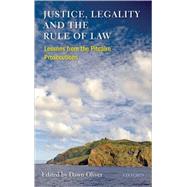Justice, Legality and the Rule of Law Lessons from the Pitcairn Prosecutions
, by Oliver, Dawn- ISBN: 9780199568666 | 0199568669
- Cover: Hardcover
- Copyright: 11/9/2009
A British colony of fifty souls in the Pacific Ocean, Pitcairn Island was settled by the Bounty mutineers and nineteen Polynesians in 1790. In 2004 six Pitcairn men were convicted of numerous offenses against girls and young women, committed over a thirty year period, in what appears to have been a culture of sexual abuse on the island. This case has raised many questions: what right did the British government have to initiate these prosecutions? Was it fair to prosecute the defendants, given that no laws had been published on the island? Indeed, what, if any, law was there on this island? This collection of essays explores the many important issues raised by the case and by the situation of a small, isolated community of this kind. It starts by looking at the background to the prosecutions, considering the dilemma that faced the British government when the abuse was uncovered, and discussing the ways in which the judges dealt with the case, as well as exploring the history of the settlement and how colonial law affects it. This background paves the way for an exploration of the philosophical, jurisprudential and ethical issues raised by the prosecutions: was it legitimate for the UK to intervene, given the absence of any common community between the UK and the Island? Was the positivist 'law on paper' approach adopted by the British government and the courts was appropriate, especially given the lack of promulgation of the laws under which the men were prosecuted? Would alternative responses such as payment of compensation to the female victims and provision of community support have been preferable? And should universal human rights claims justify the prosecutions, overriding any allegations of cultural relativism on the part of the UK?






